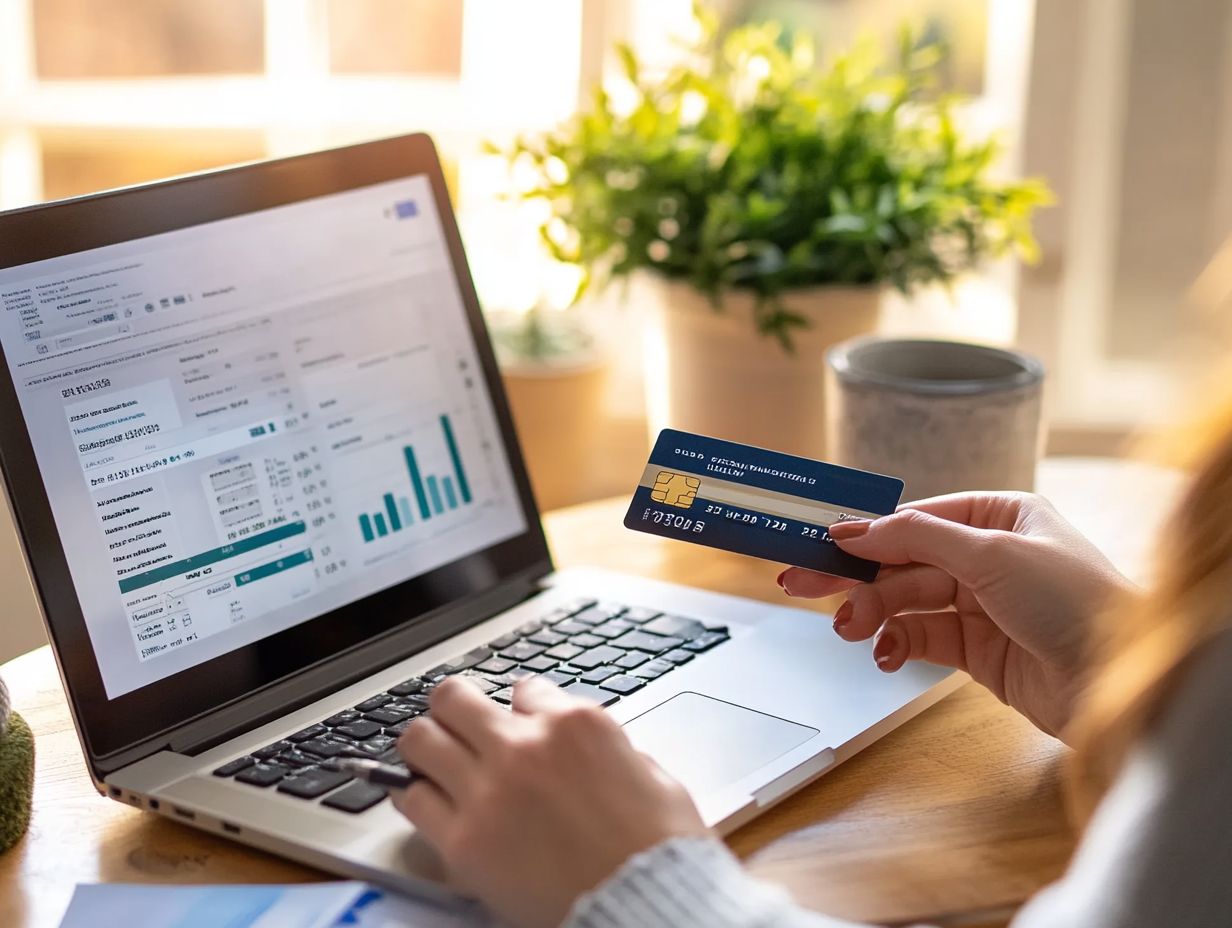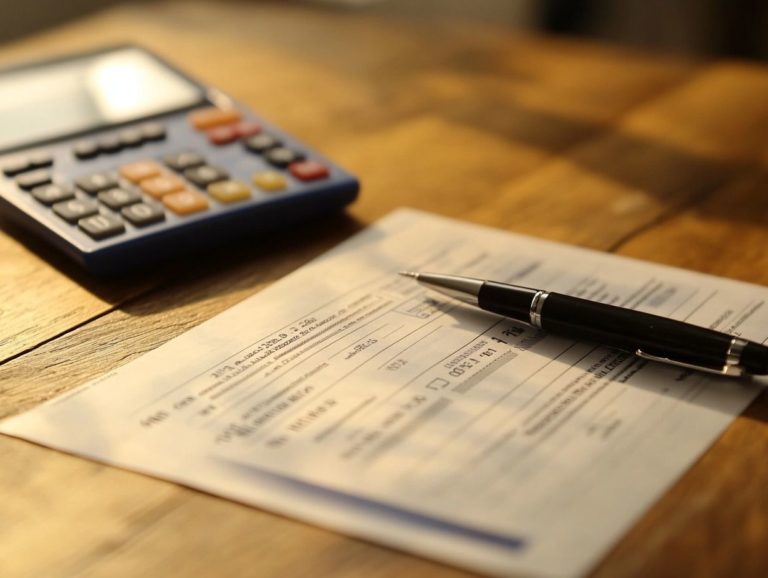How to Use a Credit Card Responsibly?
Credit cards can serve as a formidable financial asset when navigated with prudence, providing not only convenience but also rewards and the chance to enhance your credit profile.
However, without a comprehensive understanding of their mechanisms, you might find yourself ensnared in common traps that lead to debt and anxiety.
This article delves into the functionalities and benefits of credit cards, offering guidance on responsible usage and exploring potential alternatives.
Whether you re a seasoned cardholder or contemplating your very first card, you re about to gain valuable insights that will empower your financial journey.
Contents
Key Takeaways:

- Learn the basics of credit cards and their benefits to make smart choices.
- Using credit cards wisely can help you build a good credit history and earn rewards. Stick to a budget and pay off your balance on time.
- Avoid mistakes like maxing out your credit limits and late payments. Consider using debit cards or secured credit cards to manage spending better.
Understanding Credit Cards
Knowing about credit cards is essential if you want to manage your money smartly. These tools give you the ability to buy things now and pay for them later.
When used responsibly, credit cards can help you build your credit and improve your credit score. Many card issuers offer a variety of credit cards to meet different financial needs, including secured cards for those just beginning their journey or seeking to rebuild their credit history.
What is a Credit Card?
A credit card serves as a powerful financial tool that allows you to borrow funds from a card issuer, up to a predetermined credit limit, enabling you to make purchases and access immediate liquidity.
Crafted to streamline your transactions, it enables you to shop effortlessly, both online and in-store, without the hassle of cash. Your credit card may come equipped with enticing features like reward programs, cashback offers, and varying interest rates each of which can influence the total amount you end up repaying.
As a cardholder, you’re typically required to make at least a minimum monthly payment. However, maintaining a balance can lead to accruing interest, making it crucial for you to manage your spending with care. By grasping these essential elements, you can leverage your credit card not just as a convenient payment method but also as a strategic asset for building your credit history and effectively managing your personal finances. Understanding the benefits of using credit cards responsibly is key to maximizing your financial health.
How Does it Work?
Credit cards offer you the ability to make purchases on credit, allowing you to enjoy what you want now while repaying it over time, which often includes interest charges determined by the APR (Annual Percentage Rate).
Each purchase shows up in your monthly balance, and it’s important to make at least the minimum payment by the due date to steer clear of late fees. Understanding that your payment history plays a significant role in shaping your overall credit score is essential timely payments are key.
Managing your credit utilization, which is the ratio of used credit to total available credit, is vital for maintaining a strong credit profile.
By keeping your utilization under 30% and consistently paying off your balances, you can minimize fees and cultivate a positive credit history, setting the stage for more favorable lending opportunities down the line.
Benefits of Using Credit Cards Responsibly
When you use credit cards responsibly, you unlock a world of benefits that go far beyond just the ability to make purchases. They can be instrumental in building your credit profile, earning valuable rewards, and helping you achieve your financial aspirations, all provided you manage them wisely.
Take control of your financial future today by learning how to use your credit card wisely!
Building Credit History

Building a solid credit history is essential for securing favorable credit scores. These scores hinge on factors like your payment history and the responsible use of credit cards.
To effectively establish a positive credit history, focus on making timely payments on your credit card balances. Punctual payments are very important in shaping your payment history.
Keeping your credit utilization ratios low meaning the amount of credit you use compared to your total credit limit will showcase your responsible credit management. This enables you to optimize your credit scores over time.
Regularly monitoring your credit reports is crucial; it helps you identify areas for improvement and ensures that all your information is accurate.
Using credit cards for essential purchases helps elevate your credit score. By paying off the balance in full each month, you can build a strong financial foundation for future lending opportunities.
Earning Rewards and Cashback
Imagine earning rewards just by using your credit card for everyday purchases! Credit cards with rewards programs offer benefits like cash back or travel rewards, tailored to your spending habits and preferences.
These cards feature various incentive structures, catering to different lifestyles and financial objectives. For example, if you frequently make everyday purchases like groceries and gas, some credit cards offer generous cash back, making them perfect for saving on routine expenses.
If you re a travel enthusiast, you might find more value in cards that provide points redeemable for flights, hotel stays, or car rentals. These are designed to elevate your travel experiences.
Understanding your personal spending habits is crucial. The more your expenditures align with the rewards structure you choose, the more benefits you can maximize.
Ultimately, selecting the right credit card requires a thoughtful assessment of your financial behavior and preferences. This helps you fully leverage the available rewards.
How to Use a Credit Card Responsibly
To fully harness the potential of credit cards, it’s essential to adopt tips for using credit cards responsibly. This includes crafting a thoughtful budget, paying off your balances in full each month, and diligently adhering to payment due dates.
By doing so, you can avoid costly financial pitfalls and enjoy the benefits that credit cards offer.
Creating a Budget and Sticking to It
Creating and sticking to a budget is crucial for maximizing the benefits of credit cards while minimizing the risks tied to overspending and poor credit utilization.
Set clear financial boundaries and goals to track your spending habits effectively. This ensures your credit card use aligns with your long-term financial objectives.
Implementing a strategy like the 50/30/20 rule provides a structured approach. It guides you on how to allocate your income toward needs, wants, and savings.
Utilizing budgeting apps can offer real-time monitoring of transactions. This gives you insights to promote mindful spending.
This proactive management helps maintain a desirable credit utilization ratio. It also lays the groundwork for a stronger financial future overall.
Paying Off Balances in Full and On Time
Paying off your credit card balances in full and on time is essential. This practice helps you steer clear of late payments and high interest rates, leading to a healthier financial profile.
By consistently meeting your payment deadlines, you maintain a positive credit score. This sets you up to save a significant amount of money over time.
Consider setting up automatic payments or reminders to ensure those payments are made on time. These strategies minimize the risk of missing due dates, which could result in costly penalties.
Creating a budget that accounts for your credit card expenses ensures you have sufficient funds available for payments. This highlights the importance of timely financial management in avoiding unnecessary fees and maximizing your savings.
Start setting up your automatic payments today to simplify your financial management!
Common Mistakes to Avoid

Avoiding common pitfalls with credit cards, like maxing out your limits and making late payments, is crucial for maintaining a strong credit profile and effective debt management. By staying mindful of these practices, you ensure a healthier financial future while enhancing your overall creditworthiness.
Maxing Out Credit Limits
Maxing out your credit limits can significantly affect the amount of credit you re using compared to what you have available. This can lead to detrimental consequences for your credit score and overall financial well-being.
When you consistently tap into a large portion of your available credit, it raises red flags for lenders. A high utilization rate often signals a reliance on borrowed funds, which can gradually diminish your credit score.
To maintain an optimal credit utilization, aim to keep your balances below 30% of your total available credit. Leveraging budgeting apps can help you track spending habits. Also, making regular payments that exceed the monthly minimums effectively lowers your outstanding balances.
Consider strategic credit limit increases to enhance your credit health without the worry of hitting existing limits.
Making Late Payments
Making late payments on your credit cards can significantly tarnish your credit history. This results in penalties like late fees and a drop in your credit score.
This unfavorable scenario hinders your ability to secure future loans or favorable interest rates. It may even impact rental applications and insurance premiums. Set up automatic payments now to avoid late fees and ensure your bills are paid on time. This way, you won’t have to worry about forgetfulness.
Creating reminders on your smartphone or calendar adds an extra layer of security. Regularly monitoring your credit report is also crucial. It enables you to spot discrepancies and make corrections, ultimately enhancing your creditworthiness over time.
Alternatives to Credit Cards
If you re seeking alternatives to credit cards, consider options like debit cards and secured credit cards. These choices can effectively meet your financial needs while significantly reducing the risks often linked to credit card debt.
Debit Cards and Cash
Debit cards serve as a practical alternative to credit cards, allowing you to spend solely what s available in your bank account. This promotes responsible spending habits and helps you steer clear of debt.
With a debit card, you gain a clearer understanding of your finances. This encourages you to prioritize your essential needs over fleeting wants. Cash transactions can further enhance this conscious spending approach. Seeing your money physically leave your hands often leads to more mindful purchasing decisions.
Both debit cards and cash reduce the temptation to overspend and eliminate the risk of accumulating interest charges. However, it’s important to recognize their limitations. Cash can be cumbersome for online purchases, and debit cards typically lack the enticing rewards that credit options provide.
Secured Credit Cards

Secured credit cards present an excellent opportunity to build or rebuild your credit profile. They require a cash deposit that serves as collateral for your credit line. Lenders love this setup because it lowers their risk!
This arrangement not only reduces risk for lenders but also gives you a chance to enhance your credit score over time. With responsible use think timely payments and maintaining a low utilization rate a secured credit card can significantly boost your creditworthiness.
These cards are especially advantageous for those with limited or no credit history, such as students and recent graduates. They pave the way for establishing a solid credit foundation. Many secured options even come with perks like rewards and cashback, perfectly aligning with your financial needs while helping you cultivate healthier financial habits.
Frequently Asked Questions
What are the common mistakes to avoid with credit cards?
Maxing out your limits and making late payments are major pitfalls to avoid.
How can I improve my credit score?
Make timely payments, keep balances low, and monitor your credit report regularly.
Interested in learning more about managing your credit? Contact us today!
What are the benefits of using a credit card responsibly?
Using a credit card responsibly helps you build a strong credit score. To maximize your benefits, consider learning about best practices for credit card use, where you can also earn rewards, cashback, and enjoy secure payments.
How can I use a credit card responsibly?
Pay your balance in full and on time. Keep your spending within your means to maintain low credit utilization.
What are some common mistakes to avoid?
- Avoid paying only the minimum balance.
- Steer clear of maxing out your credit limit.
- Don’t apply for several cards simultaneously.
How can I track my credit card spending?
Review your monthly statements regularly. Set up alerts for purchases and utilize budgeting tools to keep an eye on your expenses.
What if I can’t pay my credit card balance in full?
If you find yourself unable to pay in full, aim to pay more than the minimum amount due. Reach out to your card issuer to explore payment options or plans.
What should I do if my credit card is lost or stolen?
Losing your credit card can be stressful! Report it to your issuer right away and watch for unauthorized charges. Most issuers have fraud protection to help you.






